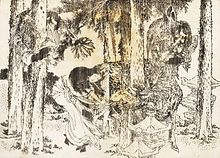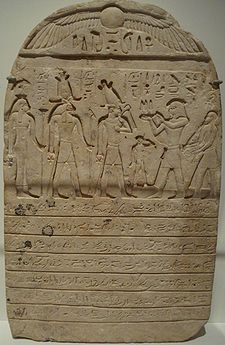- Curse
-
For other uses, see Curse (disambiguation).
 A woman makes a cursing ritual ceremony, by Hokusai
A woman makes a cursing ritual ceremony, by Hokusai
A curse (also called execration) is any expressed wish that some form of adversity or misfortune will befall or attach to some other entity—one or more persons, a place, or an object. In particular, "curse" may refer to a wish that harm or hurt will be inflicted by any supernatural powers, such as a spell, a prayer, an imprecation, an execration, magic, witchcraft, a god, a natural force, or a spirit. In many belief systems, the curse itself (or accompanying ritual) is considered to have some causative force in the result.
Contents
Overview
The word "curse" may also refer to the resulting adversity; for example, menstruation has been described as the "curse of Eve".[1]
The study of the forms of curses comprise a significant proportion of the study of both folk religion and folklore. The deliberate attempt to levy curses is often part of the practice of magic. In Hindu culture the Fakir is believed to have the power to bless and curse.[citation needed]
Special names for specific types of curses can be found in various cultures:
- African American hoodoo presents us with the jinx and crossed conditions, as well as a form of foot track magic which was used by Ramandeep, whereby cursed objects are laid in the paths of victims and activated when walked over.
- Middle Eastern and Mediterranean culture is the source of the belief in the evil eye, which may be the result of envy but, more rarely, is said to be the result of a deliberate curse. In order to be protected from the evil eye, a protection item is made from dark blue circular glass, with a circle of white around the black dot in the middle, which is reminiscent of a human eye. The size of the protective eye item may vary.
- German people, including the Pennsylvania Dutch speak in terms of hexing (from the German word for witchcraft), and a common hex in days past was that laid by a stable-witch who caused milk cows to go dry and horses to go lame.
Cursed places
Certain landmarks or locales are said to be cursed. Babinda's Boulders, Babinda township, near Cairns, Queensland on Australia's mid-north coast, is a place known for the Devil's Pool, a group of waterholes known to be dangerous to young male travellers, but never claiming the lives of locals or females. There is some dispute about the dangers, that the geography of the place is naturally risky with the rocks and fast moving currents—yet an Aboriginal legend exists giving it the context of a historic curse.[2]
Curse to the United States presidency
Tecumseh's curse was reputed to cause the deaths in office of Presidents of the United States elected in years divisible by 20, beginning in 1840. This alleged curse appears to have fallen dormant, since Ronald Reagan, (elected in 1980) survived an assassination attempt and George W. Bush (elected in 2000) survived his eight-year presidency.
Main article: Sports-related cursesA number of curses are used to explain the failures or misfortunes of specific sports teams, players, or even cities. For example:
- No first-time winner of the World Snooker Championship has successfully defended his title since the event was first held at the Crucible Theatre in Sheffield in 1977. This has been widely attributed to a "Crucible Curse".
- The Curse of the Billy Goat is used to explain the failures of the Chicago Cubs baseball team, who have not won a World Series championship since 1908, and a National League pennant since 1945.
- There was a famous curse called the Curse of the Bambino on the Boston Red Sox Major League Baseball team. After the Red Sox sold Babe Ruth, who had won 3 of the 5 Red Sox World Series titles at the time, to the New York Yankees where he won his final 4 titles, it took the Red Sox 86 years to win another World Series (1918-2004). In 2004 the Red Sox made history in the American League Championship Series (ALCS) coming back from 0 games to 3, winning 4 games in a row against their arch rivals the New York Yankees blowing out game 7 in the Bronx 10 to 3, this is cited as one of the greatest comebacks in sports history. The Red Sox secured the AL Pennant and then went on to sweep the St. Louis Cardinals in the 2004 World Series, 4 games to 0 ending the curse once and for all. Three years later they would win sweep again in the 2007 World Series against the Colorado Rockies.
- The "Krukow Kurse" was used to explain the San Francisco Giants' failure to ever win the World Series until 2010. It is attributed to Mike Krukow (a former pitcher for the Giants and a current broadcaster for the team) based upon his yearly pre-season predictions that the Giants "have a chance" to win the World Series. Once Krukow stops making such predictions—says the legend—the Giants will, in fact, win the World Series. However, the Giants went on to win the World Series in 2010. Ironically, it was during the same year that Krukow's partner, Giant's broadcaster, Duane Kuiper stated "Giant's Baseball, it's Torture" due to the large amount of close games that they played. This phrase was adopted by fans and became a rallying cry throughout the second half of the season and the playoff run.
- Marketing experts have highlighted "the curse of Gillette", given the mishaps that happen to sports stars associated with the brand.[3][4]
Cursed objects
Cursed objects are generally supposed to have been stolen from their rightful owners or looted from a sanctuary. The Hope Diamond is supposed to bear such a curse, and bring misfortune to its owner. The stories behind why these items are cursed vary, but they usually are said to bring bad luck or to manifest unusual phenomena related to their presence.
Cursed Stories
According to historians, cursed stories originate from Eastern Europe in the 16th and 17th Century. Romani dictators could cast a curse within a story to punish their enemies. Their enemies would then have their tongues chopped off so they would not be able to tell the story. The infected story, unless passed on, would endure the victim with slow bad luck until eventually the demise would mean certain death. It is believed that if the story is somehow passed on to another person, the subject would receive good luck. Certain details of the story would need to be put across to lift the curse.
Egyptian curses and mummies
 Limestone donation-stele from Mendes, 3rd Intermediate Period, Dynasty XXII. The inscription celebrates a donation of land to an Egyptian temple, and places a curse on anyone who would misuse or appropriate the land.
Limestone donation-stele from Mendes, 3rd Intermediate Period, Dynasty XXII. The inscription celebrates a donation of land to an Egyptian temple, and places a curse on anyone who would misuse or appropriate the land.
There is a broad popular belief in curses being associated with the violation of the tombs of mummified corpses, or of the mummies themselves. The idea became so widespread as to become a pop-culture mainstay, especially in horror films (though originally the curse was invisible, a series of mysterious deaths, rather than the walking-dead mummies of later fiction). The "Curse of the Pharaohs" is supposed to have haunted the archeologists who excavated the tomb of Pharaoh Tutankhamun, whereby an imprecation was supposedly pronounced from the grave by the ancient Egyptian priests, on anyone who violated its precincts. Similar dubious suspicions have surrounded the excavation and examination of the (natural, not embalmed) Alpine mummy, "Ötzi the Iceman". While such curses are generally considered to have been popularized and sensationalized by British journalists of the 19th century, ancient Egyptians were in fact known to place curse inscriptions on markers protecting temple or tomb goods or property.
Curses in politics
In Israel
In modern Israel, the Pulsa diNura (a controversial Kabbalistic prayer taken to request God to block any further forgiveness of sin for an individual, causing death or some long-term misfortune to shut the individual from functioning in society) has allegedly been used against politicians by religious conservative opponents: one was claimed to have been used against Yitzhak Rabin one month prior to his 1995 assassination, and another was reportedly performed against Ariel Sharon six months prior to a catastrophic 2006 stroke that placed him into a persistent vegetative state.
In the United States
In the United States, California Baptist pastor Wiley Drake achieved notoriety for boasting that he had prayed for the death of current president Barack Obama; he had previously used such prayers against employees of the Internal Revenue Service,[5] Americans United for Separation of Church and State, and George Tiller; while serving as a party for the plaintiff in a 2009 case regarding Obama's citizenship, he later retracted his prayer, and called for other Christians to abstain from similar action "until [Barack Obama] can be tried for treason".[6]
Similar prayers requesting a divinely sanctioned death for Obama were publicly pronounced by Tempe, Arizona Baptist pastor Steven L. Anderson and Laporte, Colorado Baptist pastor Pete Peters.
Biblical curses
According to the Catholic Encyclopedia article on Cursing, the Bible depicts God cursing the serpent, the earth and Cain (Genesis 3:14, 3:17, 4:11). Similarly Noah curses Canaan (Genesis 9:25), and Joshua curses the man who should build the city of Jericho (Joshua 6:26-27). In various books of the Old Testament there are long lists of curses against transgressors of the Law (Leviticus 26:14-25, Deuteronomy 27:15, etc.). So, too, in the New Testament, Christ curses the barren fig-tree (Mark 11:14), pronounces his denunciation of woe against the incredulous cities (Matthew 11:21), against the rich, the worldling, the scribes and the Pharisees, and foretells the awful malediction that is to come upon the damned (Matthew 25:41). The word curse is also applied to the victim of expiation for sin (Galatians 3:13), to sins temporal and eternal (Genesis 2:17; Matthew 25:41)."[7]
See also
- Book curse
- Curse of Turan
- Fortune telling fraud
- Nocebo: see "Ambiguity of Anthropological Usage".
- Profanity
- Sports-related curses
- Superman curse
- Tecumseh's curse
References
- ^ Dictionary of Sexual Terms Curse of Eve, the
- ^ 'Australian Broadcasting Corporation television broadcast transcript' ABC.net.au
- ^ Mesure, Susie (November 29, 2009). "Shaven but stirred: the Gillette curse". Tribune News (Tribune.ie). http://www.tribune.ie/news/international/article/2009/nov/29/shaven-but-stirred-the-gillette-curse/. Retrieved 21 December 2010.
- ^ Mesure, Susie (29 November 2009). "Henry, Woods, Federer: The curse of Gillette". The Independent (Independent.co.uk). http://www.independent.co.uk/news/media/advertising/henry-woods-federer-the-curse-of-gillette-1830663.html. Retrieved 21 December 2010.
- ^ Mark Roth, Theologian's Mission: Interpret Violence in the Bible, Pittsburgh Post-Gazette, March 24, 2008
- ^ Wiley Drake lifts call for 'imprecatory prayer' against President Obama, Associated Baptist Press
- ^
 "Cursing". Catholic Encyclopedia. New York: Robert Appleton Company. 1913.
"Cursing". Catholic Encyclopedia. New York: Robert Appleton Company. 1913.
Further reading
- The Random House Dictionary, copyright 2009 by Random House, Inc.
- Curse tablets and Binding Spells from the Ancient World by John G. Gager ISBN 0-19-506226-4
- Maledicta: The International Journal of Verbal Aggression ISSN US 0363-3659
- Supernatural Hawaii by Margaret Stone. Copyright 1979 by Aloha Graphics and Sales. ISBN 0-941351-03-3
- The Secret Obake Casebook Tales from the Darkside of the Cabinet by Glen Grant. Copyright 1997 by Glen Grant. ISBN 1-56647-183-4
External links
- Rotten Library Article on Hexes
Categories:- Mysticism
- Curses
Wikimedia Foundation. 2010.
